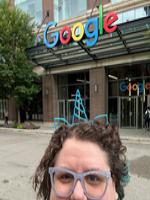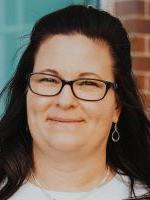Empowering All Educators to Foster Creative Learning through Makerspaces
,
Colorado Convention Center, 505/6/7
Presenters



Session description
Purpose & objective
Often Paraprofessionals and other education support staff are not a part of the conversation when it comes to creative learning and engaging Makerspace activities for students, but they are the educators who work with students, frequently those with the most complex needs, in small groups or one-on-one. This presentation will provide resources for ALL educators to engage ALL students in accessible creative learning.
Participants will understand the barriers to accessibility for creative activities for learners with special education needs.
Participants will understand the importance of inclusion for all learners.
Participants will apply universal design principles to increase accessibility for all learners.
Participants will learn how to support all staff, including related support staff, teachers, and paraprofessionals in bringing makerspace activities to small-group and one-on-one student instruction
Participants will be able to use creative learning lessons in their classrooms and districts
Participants will demonstrate successful learning by bringing the Makerspace activities back to their classrooms and districts and engaging with the Paraprofessional and other related educators on using them with their students.
Outline
3 minutes - Introductions
10 minutes - Makerspace Activity
5 minutes - Research background (Makerspaces for SpEd and Paraprofessional PD)
5 minutes - UDL and Accessibility
20 minutes - Accessible Makerspaces
15 minutes - Strategies and Resources for supporting Paraprofessionals and related staff in using and implementing Makerspace activities
2 minutes - Questions
Supporting research
https://drive.google.com/file/d/18qVPOYaGIsp4EsC2ypHFu-0Co1sEmKt_/view?usp=sharing - Imaginative Play in digital environments:
designing social and creative opportunities for
identity formation
https://www.cast.org/impact/universal-design-for-learning-udl
https://eric.ed.gov/?id=EJ1061020 (Full text of article linked on page)
Culturally Responsive Teaching and the Brain; Zaretta Hammond
Supporting the education of pupils with profound intellectual and multiple disabilities: the views of teaching assistants regarding their own learning and development needs, Martin and Alborz https://nasenjournals.onlinelibrary.wiley.com/doi/10.1111/1467-8578.12070
Session specifications
Laptop: Chromebook, Mac, PC
Tablet: Android, iOS, Windows
Learning Designer
- Collaborate with educators to develop authentic, active learning experiences that foster student agency, deepen content mastery and allow students to demonstrate their competency.
Facilitator
- Manage the use of technology and student learning strategies in digital platforms, virtual environments, hands-on makerspaces or in the field.
Innovative Designer
- Students exhibit a tolerance for ambiguity, perseverance and the capacity to work with open-ended problems.
 Return
Return Participate and share: Interactive session
Participate and share: Interactive session  Trips and Tours
Trips and Tours